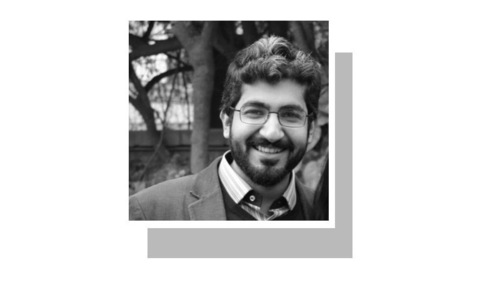Censorship is a power-driven response to an expression that deviates or tends to deviate from what is accepted as the norm defined by the system prevalent.
The norm is what is first selected and then touted and promoted as that which supports dominant power structures controlling myriad aspects of human life. When accepted and assimilated, it assumes the status of a norm. What is feared most in a non-democratic and quasi-democratic system is diversity and plurality which implies the existence of expressions that may go against and beyond the norm.
Also read part one: Banning books — dread of what challenges the unchallenged
Control is a mechanism employed to regulate and curb any expression that carries disagreement, dissent and challenge. But diversity is a phenomenon universally found in nature which we are product of. Plurality has been a part of human society despite the certainties of pre-modern age. A Punjabi adage succinctly captures the essence of the phenomenon when it say: “jinney moonh, onian gullaan” meaning there can be as many views as the mouths. The phenomenon of as many views as the mouths always rattles the powers-that-be because some of the mouths would be unrestrained and rude in questioning what is questionable but has remained unquestioned as it is protected by an aura of being impregnable.
The system can tolerate the mouths as long as they are shut or don’t utter what doubts the accepted. But some mouths would not shut and expose the profanity of what the system holds sacred.
We have an impressive list of great minds of classical era in Punjab that dared to disagree and dissent with the system that controlled political, intellectual and spiritual expressions. In the list are included luminaries such as Baba Guru Nanak, Bulleh Shah, Nijabat [who composed famous epic on the invasion of Nadir Shah], Waris Shah, Ali Haider [who in his verses excoriated and ridiculed the Mughal aristocracy for their utter failure to defend the country against foreign invasions], and Shah Muhammad [who wrote an epic on Anglo-Sikh war].
In this space, we would briefly touch how censor has treated Bulleh Shah and Waris Shah. Bulleh Shah is one of the most loved poets and saints of our land. But ironically he is the one who has been facing censor and censure ever since he came on the stage of history.
His unrestrained expression and socio-spiritual vision greatly offends both officialdom and clergy. He acquiesces to none; neither to established political authority nor to religious establishment. He castigated the ruling clique which had abysmally failed to protect the life, honour and properties of the people when they were plundered and massacred by foreign invaders such as Nadir Shah and looted by local freebooters. He denounced loudly those responsible for ensuing anarchy which led to a free- for- all.
On the other end of the spectrum was the clergy which happily supported the rulers in their shenanigans who tried to exculpate themselves from their liability. He exposed the deep nexus between political establishment and clergy offending the both. It’s well-known that he was condemned by clerics and religious scholars. A decree was issued against him and he got convicted for his heretic views. It was his guide /guru Shah Anayat who saved the day by interceding with the authorities on behalf of his disciple. He faced the wrath of the authorities even when he was dead. Rulers of Kasur interfered with his funeral rites and prevented his burial in the city’s graveyard. Public that loved him took his body and buried him outside the city which is now a shrine visited by millions. Even after his death he remains a source of anxiety for the pious and powerful. Some of his poems are censored even today when a pretence is made that he is being taught in colleges and universities. In a nutshell, Bulleh Shah, the iconoclast, has incessantly been censored and censured but his is immortal voice.
Waris Shah, our most popular poet, is another great who continues to suffer at the hands of censor which operates in different garbs. Whether it goes about its business in the name of faith or public morality or political ideology depends on the exigencies of the situation. His magnum opus ‘Heer Waris’ is the bible of people, poetry lovers and culture buffs. It has been and still is the best seller revered by millions and millions among all classes high and low. One of its fascinatingly daring aspects is the portrayal of no holds barred dialogue on man and woman relationship between Ranjha and Sehti, and erotic encounter between the hero and heroine of the tale. The dialogue is bawdy and risqué. It has all the power to ruffle the traditionalists as it expands the boundaries of unrestrained expression with gusto. The dialogue brings man and woman in public and disrobes them till they are left with no pretences. Obviously they look strangely different. The description and narration of an erotic encounter between Heer and Ranjha is out of this world and breathtakingly bold. Women known to Heer who is on her way back to home after meeting her lover imaginatively recreate the entire scene in such an evocative manner that one is left gasping for breath. The construction, which some people may feel, borders on lusciousness, even salaciousness captures the ultimate beauty of intimacy. In most editions of ‘Heer Waris’ this part of the narrative is censored to save the people especially young from the ‘corrupting influence’ of Waris Shah.
In our society, expressions, political, literary and religious, which reflect independence of mind are invariably curbed. An expression which repeats or conforms to what is already there adds nothing to human richness. And this is exactly what status quo encourages. An expression which debunks the ossified and has something new to share can make our world richer. But those who rule want riches, not a richer world. — soofi01@hotmail.com
(Concluded)
Published in Dawn, August 17th, 2020






























